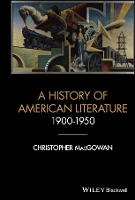


|
|
|
books
| book details |
A History of American Literature 1900-1950
By (author) Christopher Macgowan

|
This book is currently unavailable. Enquire to check if we can source a used copy
|
| book description |
For Henry Adams writing in The Education of Henry Adams (1918) his nineteenth century education had left him completely unprepared to understand the new century that he saw around him, and he feared that the impersonal technologies that characterized the new century would provide little inspiration for artists. The change would go on to be even greater than Adams had imagined. This volume of the Blackwell History of American Literature covers the period when the USA became an international power, at first regionally and then following the First Word War on the global stage. American literature explores the impact of this change upon questions of community, identity, and values from both regional and international perspectives. The early years of the 1900s saw the final works of Henry James and Mark Twain, both writers prefiguring in their own ways the challenge to comfortable certainties that would shortly come with modernism. The ways in which writers dramatized such change will be a major theme of the history. Wharton and Dreiser developed the strategies of realism and naturalism inherited from Crane and Norris. With the work of such figures as Sherwood Anderson, Ernest Hemingway, and Faulkner the acceptance of limitation, Anderson's ""little things"" in his Winesburg, Ohio, found formal parallels in the writers' challenges to the conventions of nineteenth century unities. Responding to the work of Lawrence, Joyce and Woolf among others, and the impact of Freud and new ideas in science, they looked for what still might be certain in a world of increasingly rapid change, and raised questions about what value or use any such limited certainties might have. Modernist experiment is much more muted in the work of Willa Cather, although the themes are similar, and are explored to different degrees by other writers too--the dangers of romanticizing the past, and the challenges of the transition from a pastoral, pioneer culture to an industrial one. The impact of America's international presence and the interest in formal experimentation are figured even more dramatically in developments in American poetry in the first decades of the century. Frost and Robinson challenge Romantic certainties and bring the novelistic strategies of psychological depth and social realism into their work. Frost had to move to England to find a publisher for his first book, and was helped by Ezra Pound who, along with H.D. and T.S. Eliot, was transforming the English poetry scene with calls that poetry modernize to take account of the new century, as music, prose, and painting already had. The tension between individual freedom and community or collective action is at the heart of many American narratives, as it is at the heart of much political debate in the country. The history will explore this tension, but with particular emphasis upon the way that it characterizes the writing of the 1930s, impacted as it is by the Depression, and with particular emphasis in novels on the role of media as escape and potentially violent illusion, on the devastation to farming communities--and on the crime born out of desperation, ruthlessness, and a general sense of the breakdown of communal values. In poetry, more conservative forms returned, influenced by developments in the work of Eliot, and the prominence of Auden and in the South the Fugitive Group. Literary magazines turned overtly political and demanded from the modernists poetry that took direct account of social conditions, and even sometimes demanded a particular political ideology. English Departments became the home of some leading journals, whereas in the 1920s support had often depended upon liberal patrons. Many a modernist poet balked at the restrictions, even while faced with diminishing outlets in which to publish. This theme of individuality vs individual freedom finds its culmination, in this history, with the outbreak of the Second World War and the unity of effort required for victory. The legacy of that particular unity into the later 1940s set the stage for the diversity of styles and voices that would challenge orthodoxy in the next decade in poetry, prose and drama.
| product details |
Normally shipped |
Publisher | John Wiley & Sons Inc
Published date | 1 Mar 2024
Language |
Format | Other book format
Pages | 0
Dimensions | 0 x 0 x 0mm (L x W x H)
Weight | 0g
ISBN | 978-1-1190-7278-2
Readership Age |
BISAC | literary criticism / american / general
| other options |
|
|
|
To view the items in your trolley please sign in.
| sign in |
|
|
|
| specials |
|

|
Carlo Rovelli
Paperback / softback
208 pages
was: R 295.95
now: R 265.95
|
|
|

|
Carlo Rovelli
Paperback / softback
224 pages
was: R 295.95
now: R 265.95
|
Originally published in Italian: L'ordine del tempo (Milan: Adelphi Edizioni, 2017).
|
|
|
|